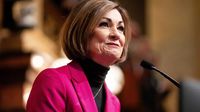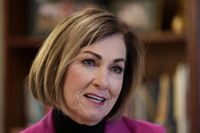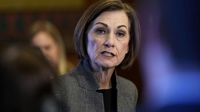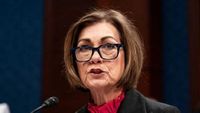In a surprising and heartfelt announcement, Iowa Governor Kim Reynolds declared on Friday, April 11, 2025, that she will not seek reelection in 2026, marking a significant shift in the state's political landscape. Reynolds, who has served as governor since 2017 and is the first woman to hold the position, cited her family as the primary reason for her decision.
"This wasn’t an easy decision, because I love this state and I love serving you," Reynolds said in a video posted on social media. The 65-year-old governor expressed her gratitude for the support she has received throughout her political career, stating, "Through the years my parents and my husband Kevin, our daughters and grandchildren have stood by my side supporting me through every challenge and every victory. Now it's time for me to be there for them." Her husband, Kevin Reynolds, has been battling lung cancer since 2023, although she noted that his condition remained in remission as of January 2025.
Reynolds began her political career as a clerk in the Clarke County Treasurer’s Office and later became the county treasurer. She was elected to the Iowa Senate in 2008 and served as lieutenant governor under former Governor Terry Branstad from 2011 until she succeeded him in 2017 when he was appointed U.S. ambassador to China. Since then, she has been reelected to full terms in 2018 and 2022, solidifying her position as a prominent figure in Iowa politics.
During her tenure, Reynolds has implemented significant changes in Iowa, particularly in tax and education policies. Under her leadership, the state has seen a reduction in the top income tax rate from 8.98% to a flat 3.8%, effective January 1, 2025. She has also touted that the tax cuts she has signed into law will reduce Iowans’ taxes by $24 billion over the next decade. Moreover, Reynolds championed a universal school choice law that allows families to receive taxpayer-funded scholarships for private school expenses, a program that is set to expand to all students in the upcoming school year.
Reynolds' administration has not been without controversy. She has faced criticism for her policies regarding abortion and transgender rights. In 2023, she called a special legislative session that resulted in a law banning most abortions after approximately six weeks of pregnancy. Additionally, she signed a bill to remove gender identity protections from the state civil rights code, which has drawn backlash from various advocacy groups.
Her decision not to run for a third term opens the door for a competitive Republican primary, as many potential candidates are already considering a run. Among them is Brad Sherman, a former state representative and pastor who announced his candidacy earlier this year. Iowa Attorney General Brenna Bird and Agriculture Secretary Mike Naig are also seen as likely contenders.
Reynolds' announcement has elicited a wave of support from Republican leaders across the state. Jeff Kaufmann, chair of the Republican Party of Iowa, praised her leadership, stating, "Gov. Reynolds has been a generational leader for our state and party. Under her bold, conservative leadership, Iowa now sits as one of the best states in the entire country. Taxes are low, cash reserves are full, our freedoms defended, and Iowa’s future has never been brighter." Similarly, U.S. Senator Joni Ernst commended her for transforming Iowa and supporting hardworking families.
However, the Democratic Party is gearing up to contest the upcoming gubernatorial election vigorously. Rita Hart, chair of the Iowa Democratic Party, expressed optimism about the 2026 election, stating, "In 2026, voters will get to hold them accountable for taking our state in the wrong direction." Iowa is currently facing challenges, including a reported $900 million budget deficit and a ranking of 49th in economic growth, which Democrats hope to leverage in the upcoming campaign.
Looking ahead, the political dynamics in Iowa are set to shift significantly with Reynolds' departure. The state has not seen an open gubernatorial race in nearly two decades, making the 2026 election particularly noteworthy. Reynolds emphasized her confidence in the future of Iowa's Republican Party, saying, "I have no doubt that Iowa and our Republican Party will remain in great hands. Together, we have built a foundation of strong conservative leadership that will continue to serve this state well." As she prepares to leave office, Reynolds remains committed to her duties until her term concludes in January 2027.
As the political landscape evolves, many eyes will be on Iowa, where the next governor will inherit a state shaped by Reynolds' policies and leadership style. With both parties preparing for a competitive race, the 2026 election promises to be a pivotal moment in Iowa's political history.










